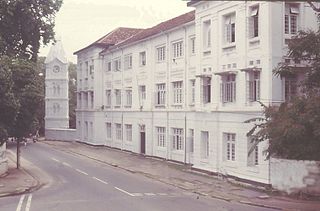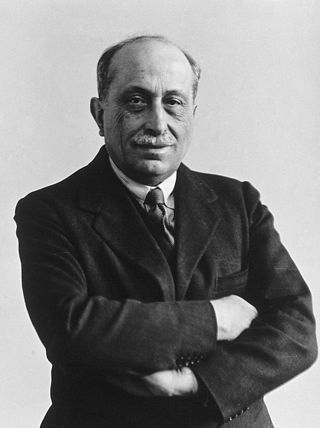This article relies largely or entirely on a single source .(June 2019) |

Albert John Chalmers (28 March 1870 - 5 April 1920) was a British colonial physician who was a research pioneer in tropical medicine.
This article relies largely or entirely on a single source .(June 2019) |

Albert John Chalmers (28 March 1870 - 5 April 1920) was a British colonial physician who was a research pioneer in tropical medicine.
Albert John Chalmers was born in Manchester on 28 March 1870. He received his qualifications in 1890 at University College, Liverpool, [1] holding the Holt Fellowship. He joined the West African Medical Service, where he served for four years at the Gold Coast Colony, as the assistant colonial surgeon. He was the acting principal medical officer in the colony during the Siege of Kumassi in 1900 when he was mentioned in despatches and subsequently received the Ashanti Medal and clasp for his service. [1]
He left for Ceylon in 1901 where he worked for the next ten years as the registrar and lecturer on pathology at the Colombo Medical College. [1]
He was a captain in the Ceylon Volunteer Medical Corps and president of the Ceylon branch of the British Medical Association in 1907. [1]
In 1911 he was awarded the King George V Coronation Medal. After serving with the Pellagra Field Commission in 1913 he was appointed as the Director of the Wellcome Tropical Research Laboratories in Khartoum. [2] By then he was a well known name in tropical medicine. While in Colombo he co-authored with Aldo Castellani the Manual of Tropical Medicine , the first edition of which appeared in 1910 and was described by F. H. Garrison as “the best modern book on tropical medicine”.
In February 1920, Chalmers turned in his resignation to the Sudan Government and left to travel the world with his wife Alice. While traveling in India, Chalmers fell ill and died on 5 April 1920 of acute infective jaundice. [2]
The Chalmers Memorial Medal is offered annually by the Royal Society of Tropical Medicine and Hygiene, in recognition of outstanding research contributing to knowledge of tropical medicine and tropical hygiene. [3]

Ceylon Medical College was a public medical school in Ceylon. The college was established in 1870 as the Colombo Medical School. The college was based in Colombo. The college was merged with Ceylon University College in 1942 to form the University of Ceylon. The medical college became the university's faculty of medicine. The college was also known as Colombo Medical College.
The Royal Society of Tropical Medicine and Hygiene, more commonly known by its acronym RSTMH, was founded in 1907 by Sir James Cantlie and George Carmichael Low. Sir Patrick Manson, the Society's first President (1907–1909), was recognised as "the father of tropical medicine" by his biographer. He passed the post on to Sir Ronald Ross, discoverer of the role of mosquitoes in the transmission of malaria.

Aldo Luigi Mario Castellani, Marchese di Chisimajo, KCMG was an Italian pathologist and bacteriologist. He is best remembered as discoverer of the etiology of sleeping sickness and Yaws (1905), as a pioneer in the development and use of combined vaccines.
Sir Brian Mellor Greenwood, CBE, FRCP, FRS is a British physician, biomedical research scientist, academic, and recipient of the first Hideyo Noguchi Africa Prize.

Sir Andrew Balfour was a Scottish Medical Officer who specialised in tropical medicine. Balfour spent twelve years in Khartoum, Sudan and was the Medical Officer of Health in the city. As well as writing medical publications, Balfour also wrote historical fiction and fantasy novels, the majority of which were published from 1897 to 1903. In his youth Balfour was also a notable sportsman playing rugby union for Cambridge University in the Varsity Match and was selected to represent the Scotland national team.

Sir Alimuddin Zumla,, FRCP, FRCPath, FRSB is a British-Zambian professor of infectious diseases and international health at University College London Medical School. He specialises in infectious and tropical diseases, clinical immunology, and internal medicine, with a special interest in HIV/AIDS, respiratory infections, and diseases of poverty. He is known for his leadership of infectious/tropical diseases research and capacity development activities. He was awarded a Knighthood in the 2017 Queens Birthday Honours list for services to public health and protection from infectious disease. In 2012, he was awarded Zambia's highest civilian honour, the Order of the Grand Commander of Distinguished services - First Division. In 2023, for the sixth consecutive year, Zumla was recognised by Clarivate Analytics, Web of Science as one of the world's top 1% most cited researchers. In 2021 Sir Zumla was elected as Fellow of The World Academy of Sciences.
Panagodage Bertram Fernando LMS (Ceylon) MBBS (London), MD FRCP DTM&H OBE is First Professor of Medicine Ceylon Medical College and Faculty of Medicine University of Colombo. Fernando was educated like Marcus Fernando at St. Benedict's College, Colombo. He was awarded a Government scholarship to the Ceylon Medical College in 1918 and qualified with L.M.S. (Ceylon) in 1923. In 1930 he attended University College Hospital, London, M.B. B.S. (1931) and obtaining MRCP in 1932 and the diploma in tropical medicine and hygiene. He was awarded an M.D. in 1951, and elected F.R.C.P. in 1952, the first Ceylonese to be awarded that distinction.

Percy Cyril Claude Garnham CMG FRS, was a British biologist and parasitologist. On his 90th birthday, he was called the "greatest living parasitologist".
The Manson Medal, named in honour of Sir Patrick Manson, is the highest accolade the Royal Society of Tropical Medicine and Hygiene awards. Started in 1923, it is awarded triennially to an individual whose contribution to tropical medicine or hygiene is deemed worthy by the council.

Sir Philip HenryManson-Bahr, CMG, DSO, MA Cantab, MB BChir, MD, MRCP, FRCP was an English zoologist and physician known for his contributions to tropical medicine. He changed his birth name to Manson-Bahr after marrying Edith Margaret Manson, daughter of the doyen of tropical medicine Sir Patrick Manson. Following his father-in-law, he devoted much of his career to tropical medicine. He was a Consulting Physician, and held high offices at the London School of Hygiene & Tropical Medicine and at the London Hospital. He was knighted in 1941.

Dr. Blasio Vincent Oriedo, in full Dr. Blasio Vincent Ndale Esau Oriedo was an African epidemiologist and a parasitological scientist known for his contributions to tropical medicine and work to stem disease epidemics in colonial and postcolonial Kenya, the countries of East and Central Africa, and the Sudan. He is credited for saving thousands of native African lives from infectious disease. Dr. Oriedo was a recipient of the Extramural Medical Research Grant presented by the US National Institutes of Health (NIH).

Clement Clapton Chesterman OBE was an English writer, Christian missionary, humanitarian and physician. He was a medical missionary for the Baptist Missionary Society that served in the Belgian Congo, more specifically Yakusu. He was responsible for the establishment of a hospital, community-based dispensaries and training centres of medical auxiliaries. Chesterman's network of health dispensaries employed preventive medicine using the new drug tryparsamide to combat the prevalent issue of sleeping sickness in the area. His implementation of mass chemotherapy was extremely successful in eliminating the disease. Such success led to his methods being widely adopted in Africa, making Chesterman a prominent contributor to the field of tropical medicine. In 1974 he was knighted by Queen Elizabeth.

The Chalmers Medal is the major mid-career award of the Royal Society of Tropical Medicine and Hygiene. The Chalmers Medal was initially awarded biennially, then annually, "in recognition of research of outstanding merit contributing to our knowledge of tropical medicine or tropical hygiene" and now "to researchers in tropical medicine or international health who obtained their last relevant qualification between 15 and 20 years ago, allowing for career breaks, who demonstrate evidence of mentoring and professional development of junior investigators, and other forms of capacity-building in line with Dr Chalmers’ own values". It is named in honour of Albert John Chalmers MD, FRCS, DPH, who was acclaimed for his work on tropical medicine on the Indian sub-continent.
Kamini Nirmala Mendis is a Sri Lankan professor emeritus at the University of Colombo and former malaria expert at the World Health Organization (WHO).

David Hurst Molyneux CMG is a British parasitologist who served as the director of the Liverpool School of Tropical Medicine (1991–2000), where, as of 2018, he is an emeritus professor. He previously held the Chair of Biological Sciences at the University of Salford (1977–91), where he also served as Dean of the Faculty of Science. His research and advocacy have focused on what are now known as neglected tropical diseases, and Michael Barrett credits him as among the earliest advocates of the campaign to focus international attention on this group of diseases in the early-to-mid 2000s.
Azra Catherine Hilary Ghani is a British epidemiologist who is a professor of Infectious Disease Epidemiology at Imperial College London. Her research considers the mathematical modelling of infectious diseases, including malaria, bovine spongiform encephalopathy and coronavirus. She has worked with the World Health Organization on their technical strategy for malaria. She is associate director of the MRC Centre for Global Infectious Disease Analysis.

John Andrew Crump MB ChB, MD, DTM&H, FRACP, FRCPA, FRCP is a New Zealand-born infectious diseases physician, medical microbiologist, and epidemiologist. He is Professor of Medicine, Pathology, and Global Health at the University of Otago and an adjunct professor of medicine, Pathology, and Global Health at Duke University. He served as inaugural co-director of the Otago Global Health Institute, one of the university's research centres. His primary research interest is fever in the tropics, focusing on invasive bacterial diseases and bacterial zoonoses.

George Macdonald was a British physician who was Professor of Tropical Hygiene at the London School of Hygiene & Tropical Medicine. His research concentrated primarily on malaria, its epidemiology and control. He was the author of many papers on the mathematical analysis of transmission of tropical infections and the author of The Epidemiology and Control of Malaria, published in 1957.

Ahmed Mohamed El HassanFRCP FTWAS was a Sudanese professor of pathology.
Joanne P. Webster is a British epidemiologist who is the Royal Veterinary College Chair in Parasitic Diseases, Director of the Centre for Emerging, Endemic and Exotic Diseases and Professor of Infectious Diseases at Imperial College London. She is a Fellow of the Royal Society of Biology and Fellow of the Academy of Medical Sciences.
{{cite book}}: CS1 maint: location (link)Publications by AJ Chalmers at Google Scholar